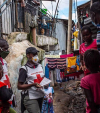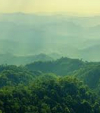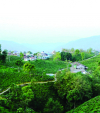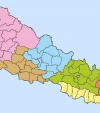
OR
Open letter to Sarita Giri
Published On: May 25, 2020 02:00 PM NPT By: Jivesh Jha
Dear Sarita Giri, recently you said that Nepal should have consulted India before publishing the new map showing Limpiyadhura, Lipulek and Kalapani of Nepal. You seem to think Nepal’s sovereignty—internally (at domestic level) and externally (at international stages)—is subject to approval or disapproval by neighbouring countries. What a pity!
Innovating online education
Published On: May 24, 2020 05:00 PM NPT By: Sagar Gyawali
Prior to COVID-19 pandemic, the now popular online education system had rarely become a priority for Nepali academic institutions. Now the nationwide lockdown has compelled the majority of the institutions and their teachers to run their classes online, mostly by using Zoom software. The evolving trend in the Nepali education system has thus made Nepali teachers, students, and parents familiar with the online classes. Thus COVID-19 has made virtual teaching and learning a new normal. But without proper plans, sufficient technological tools, and much-needed awareness among all stakeholders, it won’t be possible to achieve positive outcomes from ongoing online education. The past experiences have shown that poorly designed technologies rather discourage the teachers and students from adopting it.
The rich world’s pandemic imperative
Published On: May 24, 2020 03:30 PM NPT By: Anne O Krueger
WASHINGTON, DC – COVID-19 has confronted the world with a horrific crisis. Because developing a vaccine will likely take at least a year, governments need to buy time to keep health-care facilities from being overwhelmed and to minimize the number of people who fall ill and die, not least by reducing the rate of new infections.
Time to restore human relations with nature and biodiversity
Published On: May 24, 2020 02:45 PM NPT By: QU Dongyu and Inger Andersen
The COVID-19 pandemic is a deep and lasting shock at global level; we all know that returning to “business as usual” is not an option. It is imperative that we perceive the crisis as an opportunity to rebuild—and even improve—livelihoods in a sustainable way. High on the agenda is restoring harmony to humanity’s relationship with nature, and particularly with biodiversity.
What will become of natural world?
Published On: May 22, 2020 03:00 PM NPT By: Sujita Dhakal
Advantage nature. This is one thing that has happened by default amid the scourge of Covid-19 pandemic. It took us to be in global lockdown to allow the natural world we have degraded so much to heal itself to some extent. And the visuals of wild animals roaming our streets, vegetation reclaiming their spaces, skies clearing up offering spectacular views of mountains have been feast for our eyes as we shield ourselves indoors. Satellites have shown Carbon Dioxide emissions dropping deep even in major polluters like China and India.
Anxiety of surplus electricity
Published On: May 22, 2020 02:00 PM NPT By: Prabal Adhikari
It’s a bare fact that our hydropower projects are spilling during off-peak hours from May to November and it is triggered by either snowmelt runoff or monsoon precipitation. The situation of having electric power or energy to generate more than the domestic demand of the country, as of now, may be of two types: daily surplus or seasonal surplus. As per the simulation results based on certain assumptions of commissioning hydropower projects, Nepal will be in the state of seasonal surplus till the year 2027 from which Nepal will be a pure exporter of power on RoY (Round-the-Year) basis.
Let facts and reasons guide the border debate
Published On: May 22, 2020 12:36 PM NPT By: Mahabir Paudyal
The message to be spread is predetermined. Panelists seem to have been invited only to get it reinforced. The host begins by saying China is using Nepal. China is nobody’s friend. China is alone in the world. Nepal has released the new political map on China’s behest. Nepal’s claim on Lipulekh-Kalapani-Limpiyadhura region is groundless. The host shouts out loud, almost shrieks. When Nepali panelists start speaking, the host reiterates the same position. The Nepali panelists are literally given no time to make their points.
Big failure of small government
Published On: May 20, 2020 03:00 PM NPT By: Mariana Mazzucato and Giulio Quaggiotto
LONDON – Decades of privatization, outsourcing, and budget cuts in the name of “efficiency” have significantly hampered many governments’ responses to the COVID-19 crisis. At the same time, successful responses by other governments have shown that investments in core public-sector capabilities make all the difference in times of emergency. The countries that have handled the crisis well are those where the state maintains a productive relationship with value creators in society, by investing in critical capacities and designing private-sector contracts to serve the public interest.
Reawakening in Nepal for territory
Published On: May 20, 2020 02:18 PM NPT By: Devendra Gautam
The government of Nepal recently endorsed a new political map of Nepal by including the Limpiadhura region. This move came days after the government of India inaugurated a road linking India to Tibet of China through Lipulek, which forms part of the Limpiadhura region.
Democracies are better at managing crises
Published On: May 20, 2020 02:00 PM NPT By: Shlomo Ben-Ami
TEL AVIV – The COVID-19 crisis has become the latest front in the escalating clash of ideologies that has become a central feature of geopolitics in recent years. Representing authoritarianism is China, which has touted the success of its aggressive lockdown strategy in curbing the coronavirus’s spread. Representing democracy are a broad array of countries, some of which have responded far worse than others. So, which political system is better suited to managing crises?







Just In
- CM Kandel requests Finance Minister Pun to put Karnali province in priority in upcoming budget
- Australia reduces TR visa age limit and duration as it implements stricter regulations for foreign students
- Govt aims to surpass Rs 10 trillion GDP mark in next five years
- Govt appoints 77 Liaison Officers for mountain climbing management for spring season
- EC decides to permit public vehicles to operate freely on day of by-election
- Fugitive arrested after 26 years
- Indian Potash Ltd secures contract to bring 30,000 tons of urea within 107 days
- CAN adds four players to squad for T20 series against West Indies 'A'









_20200522123643.jpg)










